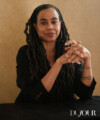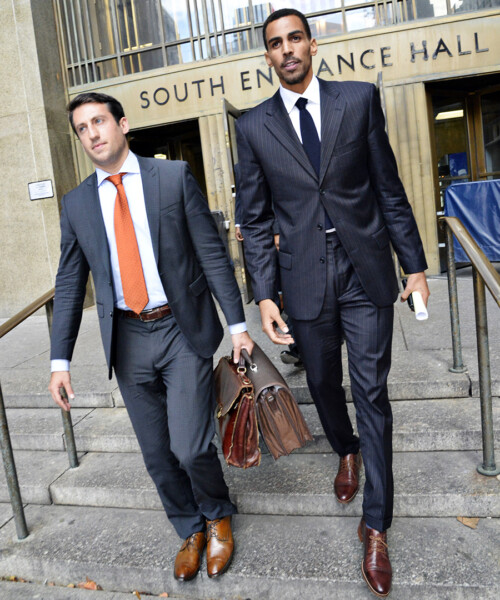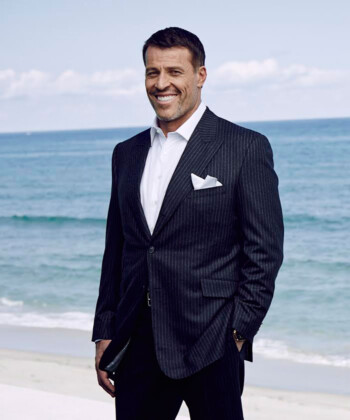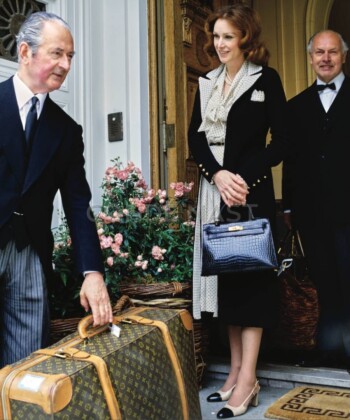It’s understood the courtroom can produce performers as memorable as those born in a more traditional theater. Of course, because they typically represent high-profile clients and command fees to match, these legal stars usually have decades of experience to back up their bravado (see: Gloria Allred, Johnnie Cochran, Alan Dershowitz). But Alex Spiro, the telegenic young attorney who’s lately become a favorite of the legal tabloids, is not typical. In four short years, the Harvard Law School graduate has gone from pleading out petty crimes as a Manhattan Assistant District Attorney to representing some of the most headline-making defendants in recent memory: Princeton grad Thomas Gilbert Jr. (who, in 2015, was accused of killing his father for cutting his allowance); Atlanta Hawks’ shooting guard Thabo Sefolosha (who, weeks before the playoffs, suffered a broken leg in an altercation with the N.Y.P.D.—for which he was arrested); and rapper Bobby Shmurda (who, last fall, accepted a plea deal on charges that included conspiracy to commit murder, in a case that would have hinged in part on whether lyrics are admissible as confessions and could have had chilling First Amendment consequences).

Alex Spiro in his Midtown East office
Photo by Jefferson Siege, NY Daily News via Getty Images
But how did Spiro get here, and so quickly? Especially considering the lawyer, now 34, intended to pursue a career in psychiatry. While briefly directing a program for children with autism at Massachusetts’ McLean Hospital, Spiro saw a side of policy that led him to believe his silver tongue would better serve the legal profession. He went to Harvard, did a short stint at the C.I.A. (about which he is reluctant to talk, although it’s listed on his LinkedIn profile), and was then referred to the D.A.’s office. There, eager to take on as much as he could, as fast as he could, Spiro began volunteering for the more thankless cases. Then he began winning them.
“Like in any job, you can say ‘I will do what I have to do,’ or you can say, ‘I will do as much as anyone will let me—for the city, for the people, and for myself,’” Spiro says. During his four years as A.D.A., he moved from prosecuting misdemeanors to murders—among them additional charges against Rodney Alcala, a 1970s-era serial killer with shades of Ted Bundy. (Alcala was already on death row in California, but by winning further convictions Spiro helped close two 40-year-old homicides.)

Alex Spiro
Considering his early work as a prosecutor, Spiro’s 2013 decampment for the office of Ben Brafman—a self-described “short Jewish guy” who also happens to be one of New York’s most famous private defense attorneys—was surprising. Still, “it’s not like an N.B.A. player going to play hockey,” Spiro says. “The laws and procedures are the same. Both take a certain amount of creativity, but different kinds.” Different kinds of creativity, maybe, but the same level of energy: full throttle.
While work ethic and education are certainly factors in Spiro’s meteoric rise, it’s clear that personality, too, is a significant ingredient: Spiro’s is outsize. Tall, with a baritone voice, he’s assertive, talkative, highly confident, and intensely energetic—a fast-dealing big-city lawyer straight out of central casting. He’s also close in age to most of his clients, another reason young men in the public eye who end up in trouble might find him easy to relate to—and trust.
“I really do have a relentless way of working,” Spiro says. “A detective I used to work with used to say, ‘Spiro, put a tack in your shoe.’ What he meant was I don’t have to go a hundred miles a day. But some people only know one speed.” Despite an impossibly packed schedule, Spiro replies to emails seemingly before they’re sent, an attribute those paying a premium to retain him surely find appealing.
Athletes facing legal trouble are among those who appreciate Spiro’s speed. He represented Sefolosha, the basketball player who was charged with disorderly conduct and resisting arrest after an altercation with police outside a Manhattan nightclub left him with a broken leg. Sefolosha was acquitted (Spiro is now representing him in a civil suit against the N.Y.P.D.) and his case became part of the national dialogue about police brutality against black men. More work with the N.B.A. followed, as did a growing awareness of the ways in which some of its players’ experiences with law enforcement aligned with—and could be used to highlight—issues championed by the Black Lives Matter movement.

Spiro and Thomas Gilbert Jr. in Manhattan Criminal Court, January 9, 2015
Sefolosha’s case was followed by that of Shmurda (née Ackquille Pollard), the 22-year-old Brooklyn rapper who, in 2014—just as his hit single “Hot Boy” landed him a record deal—himself landed on Rikers Island with a $2 million bail requirement on allegations he ran an East Flatbush gang, his lyrics the blueprint for their crimes. (Fourteen other young men were arrested with him.) Unable to make bail, Pollard spent two years in jail awaiting trial. Then, last year, prosecutors approached him with a plea deal Spiro urged him to take. He did—before reportedly telling the judge he no longer wished to waive his right to trial and wanted to fire his lawyer. The deal went ahead: Pollard got seven years in October. Two months later, one of his co-defendants, Santino Boderick, went to trial and received a 130-year sentence.
While Pollard’s legal battle was rabidly followed by Billboard and The Fader, Spiro sees its core concerns, like those in Sefolosha’s proceedings, as running parallel to the disturbing cases of less notable young black men from the inner city. “It’s rare that a poor kid from a poor neighborhood, [who is also] a person of color, is injected into a high-profile case,” Spiro says. Pollard’s case, and especially the cases of his co-defendants, “touch on a lot of issues—in terms of bail, conspiracy law, change of venue, juvenile justice, second chances, and length of incarceration.”
Spiro believes the unique position he’s achieved among high-profile figures in sports and music can allow him to help move the needle on criminal justice reform. He chairs the Legal Advisory Council for the Fair Punishment Project, a Harvard Law initiative on justice system reform, and helps advocate for Gideon’s Promise, a non-profit that trains public defenders. Perhaps more visibly, he’s served as a conduit between the advocates working on these issues and the athletes and entertainers invested in them, facilitating celebrity attendance at fundraisers hosted by Jason Flom, the music mogul–cum–founding board member of the Innocence Project, and Jonathan Rapping, the president of Gideon’s Promise. He’s most recently been retained to represent Walter “Hawk” Newsome, the president of Black Lives Matter of Greater New York. Still, not all of Spiro’s cases naturally align with civil rights. Besides Newsome, his two biggest clients are currently Gilbert Jr. and Aaron Hernandez, the former New England Patriot facing his second murder case in as many years. Both will likely be tried later this year, and neither seems to have much obvious nuance—but you can bet Spiro doesn’t see it that way.
Main image: Thabo Sefolosha leaving court with Spiro, October 5, 2015.






































